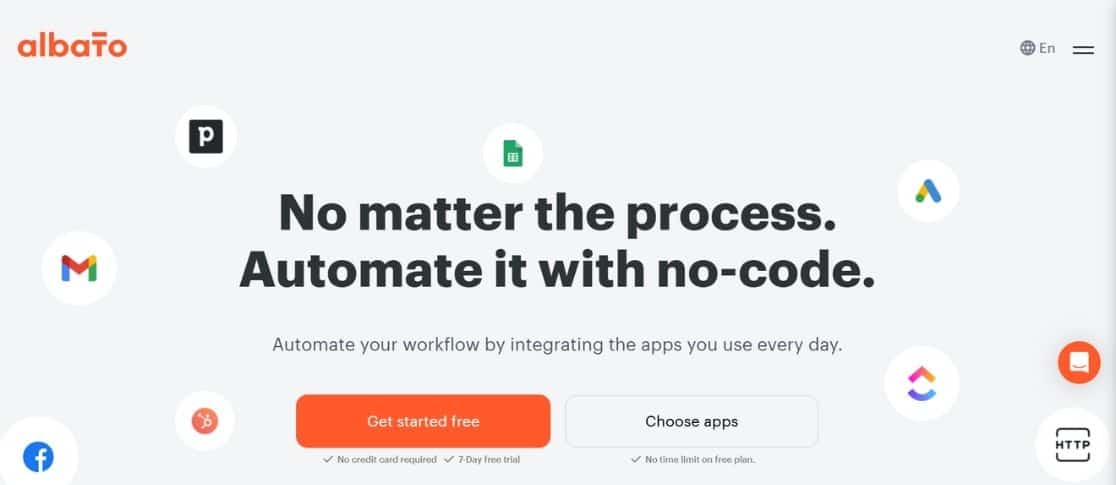Albato
Albato Review: A Comprehensive Look at the No-Code Automation Platform

Albato is a no-code automation platform designed to connect and automate tasks between various apps. Are you tired of manually transferring data between your favorite apps? Do you dream of a seamless workflow where information flows effortlessly between different platforms? This review will explore Albato’s features, pricing, and user experience to help you decide if it’s the right automation solution for you. We’ll delve into its strengths and weaknesses, providing a clear picture of what you can expect.
Streamlining your workflow with effective automation can significantly boost productivity and free up valuable time. By automating repetitive tasks, you can focus on more strategic activities that drive growth. Albato aims to be your go-to solution for achieving this seamless automation. This review will equip you with the knowledge you need to make an informed decision about integrating Albato into your workflow.
What is Albato?
Albato is a no-code platform that allows users to connect various apps and automate workflows. It boasts a user-friendly interface, making it accessible to both technical and non-technical users. Albato emphasizes its ability to handle complex automation scenarios, enabling users to build entire ecosystems across dozens of apps and platforms. It positions itself as a “single platform for all automations.”
Key Features of Albato
- No-Code Builder: Albato’s drag-and-drop interface allows users to create automations without writing any code. This simplifies the process of connecting apps and defining workflows.
- Wide Range of Integrations: Albato offers integrations with over 800 apps, including popular platforms like Google Sheets, Facebook, Slack, and more. This extensive library allows for diverse automation possibilities.
- Custom App Integration: If your desired app isn’t available, Albato provides an App Integrator, allowing you to add it yourself. This offers flexibility for users with unique integration needs.
- 24/7 Support: Albato provides round-the-clock customer support in multiple languages. This ensures assistance is readily available when needed.
- Data Migration: Albato facilitates the migration of large datasets between apps. This is a valuable feature for users transitioning between platforms or consolidating data.
Albato Pricing
Albato offers a free plan with no time limit, allowing users to explore the platform and build basic automations. Paid plans offer increased functionality and higher usage limits. This tiered pricing structure caters to various user needs and budgets.
Albato User Experience
Albato prides itself on its simple and intuitive UI. The platform is designed to be easy to navigate, even for users with limited technical experience. The drag-and-drop interface and clear visual representation of workflows contribute to a positive user experience.
Albato Alternatives
While Albato offers a robust automation solution, it’s important to consider alternatives like Zapier, Make (formerly Integromat), and IFTTT. Each platform has its strengths and weaknesses, and the best choice depends on specific user requirements. Comparing features, pricing, and integrations can help you choose the most suitable platform.
Albato: Is it Right for You?
Albato is a powerful tool for automating workflows and connecting apps. Its no-code approach, wide range of integrations, and user-friendly interface make it an attractive option for businesses and individuals seeking to streamline their processes. However, considering alternatives and evaluating your specific needs is crucial before committing to a platform.
Albato: Tips and Tricks from AItoolsbiz
Based on our experience, here are some tips for maximizing your use of Albato:
- Start Small: Begin with simple automations and gradually increase complexity as you become more comfortable with the platform.
- Explore the Tutorials: Albato offers tutorials and documentation to guide users through various automation scenarios. Leveraging these resources can significantly enhance your understanding and efficiency.
- Utilize the Support Team: Don’t hesitate to contact Albato’s support team for assistance. Their responsiveness and expertise can be invaluable in troubleshooting issues or optimizing your workflows.
Common Mistakes to Avoid with Albato
- Overcomplicating Workflows: While Albato can handle complex automations, it’s best to keep workflows as simple as possible. This simplifies troubleshooting and maintenance.
- Ignoring Error Handling: Implement proper error handling within your automations to prevent unexpected issues and ensure data integrity.
- Not Testing Thoroughly: Always test your automations thoroughly before deploying them to production. This helps identify and address any potential problems early on.
Frequently Asked Questions (FAQs)
What are the key benefits of using Albato?
Albato offers several key benefits, including its no-code platform, a wide range of app integrations, custom app integration capabilities, 24/7 support, and data migration features. These features allow users to automate tasks, streamline workflows, and improve overall productivity.
How does Albato compare to other automation platforms like Zapier or Make?
While all three platforms offer no-code automation solutions, Albato differentiates itself through its focus on complex scenarios, custom app integration, and competitive pricing. Zapier is known for its extensive app library and ease of use, while Make excels in visual workflow building and complex logic. Choosing the right platform depends on your specific needs and budget.
Is Albato suitable for both technical and non-technical users?
Yes, Albato is designed to be user-friendly and accessible to both technical and non-technical users. Its intuitive interface and drag-and-drop builder simplify the automation process, making it easy for anyone to create and manage workflows.
We encourage you to explore Albato and experience its automation capabilities firsthand. Visit aitoolsbiz.com to learn more about AI tools and discover other innovative solutions to enhance your productivity. Don’t forget to check out our blog for more insights and reviews on the latest AI advancements.
20% discount code: GIMME20%OFF
